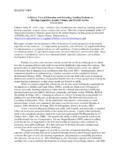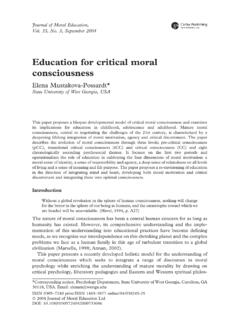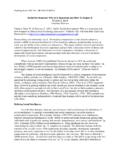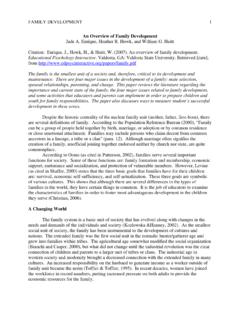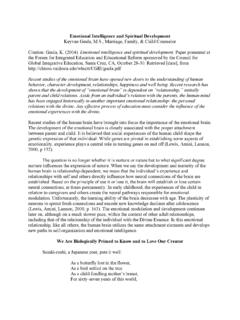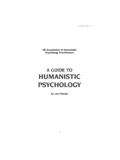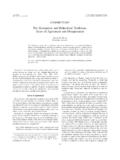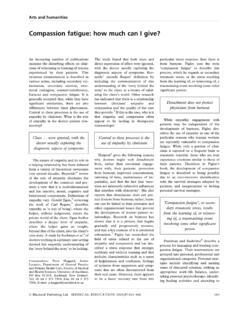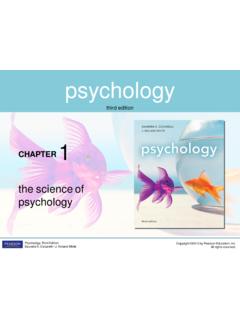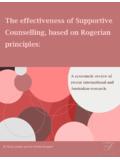Transcription of Humanistic Theory versus Social Cognition and …
1 Running head: Humanistic AND Social Cognition THEORIES 1 Humanistic Theory versus Social Cognition and Their Applicability in a Supervisory Role Allen Ben-Harush May 2009 PSYC 3130: Educational Psychology for Teachers of Adults Valdosta State University Humanistic AND Social Cognition THEORIES 2 Abstract Several learning theories proposed by psychological visionaries have been compared to and contrasted with each other since their inception. Two such theories, Humanistic Theory and the Social cognitive Theory , are theories associable to office and corporate environments. Conducting a comparison of these two theories and noting their applicability to a workplace environment in a supervisory role is the basis for the following report. To understand the comparison to the fullest extent, however, a definition of the diversity of office personnel must be performed in conjunction with the notation of specific contextual principles and activities.
2 Lastly, a discussion regarding the implementation of these principles in the relative environment finishes the topic. Humanistic AND Social Cognition THEORIES 3 Humanistic Theory versus Social Cognition and Their Applicability in a Supervisory Role Humanistic and the Social cognitive Theory are two theories that I find to be extremely applicable to a person in an educational field. To understand fully what the two theories have to offer is something that I think an instructor or professor must undergo prior to entering any field specific to education. However, one isse not really noted is that these theories (and all of the other learning theories as well), in my opinion, can be applied contextually to an office or corporate environment. A thorough examination of the compared and contrasted traits of Humanistic Theory and Social Cognition in their applicability to a corporate environment and usage in a supervisory role is what encompasses this presentation.
3 For the environment relevant to this paper, I will be working as a Human Resource representative in any hypothetical office building for a corporation not named. The employees are my students, and the material to be taught is Human Resource Development, soft skills, and upgrading workplace performance. To understand the type of adult learners an office environment has in it, a person must fully understand the basic principles of adult education, as portrayed best by Malcolm Knowles. Knowles s philosophies are described by Smith s (2002) biography of Knowles. He (as written in Knowles, 1984) discusses five traits descriptive of adult learners: their self concept, their experience, their readiness to learn, their orientation to learning, and finally, their motivation to learn.
4 People working in an office may or may not be actively pursuing any sort of educative experience, but I believe that education is a constant revolution of the mind and occurs internally. The diversity of the different variations of office environments is similar to that of the contents of a jar of jelly beans. Even more diverse, the people working in the environments characterize this description of adult learners because of their ages. Humanistic AND Social Cognition THEORIES 4 The people in these offices are no different than you and me. I think that Lieb s (1991) characteristics of these adults in these hypothetical offices are quite spot on. He discusses how these adult learners are autonomous and self directed; how their motivation to learn is inclined by a contextual practicality and relevance to goals.
5 They will most likely have a latent penchant for learning, whether it be training for the job or having a mental change about something brought about because of a recent experience. I agree whole-heartedly with these descriptions, because through my own experiences, I have found that the tendency of people to personify these traits happen quite often. These adults will most likely learn new skills about human interaction because of working in an atmosphere like this, and I think that the perception for student learning is thrown out for terminology appropriate to an office environment: training and briefing. Humanistic Theory Seeded into Knowles s philosophies of adult learning, Humanistic Theory s primary focuses are peoples needs, self-concept/esteem, and values (Huitt, 2006, May).
6 Edwords (as cited in Huitt, 2001) describes humanism as a school of thought that believes human beings are different from other species and possess capacities not found in animals. What this tells me is that people have feelings and their feelings dictate their learning beliefs. If a person has a low self-esteem, then he or she will not follow well in an educative capacity. The instructor or professor must make sure to assess the classroom environment s atmosphere prior to continuing the material. Concisely speaking, asking a student, are you ok? or, what s wrong? may fix a wholesome esteem defect and assist with better material absorption and implementation. I think that people are capable of listening and learning better by how their perception is maintained of other individuals (discussed later regarding Social Cognition ).
7 This is most likely Humanistic AND Social Cognition THEORIES 5 relevant to the workplace. I think that an educator should exemplify Humanistic ideals to be fully effective. Bieler (2006), who is a proponent for career skills and bettering people in the workplace, states, Don t try to make others conform to all of your ideas and you will earn new friends and respect ( ). Practically speaking, static ways of education versus facilitation of learning is probably the best route for maximum educative quality. Gage and Berliner (as cited in Huitt, 2001) discuss five Humanistic objectives to education as described by which are to promote autonomy, develop responsibility for learned material, develop creativity and curiosity, and finally, expressing an interest in artistic endeavors.
8 Keep note of that last objective, as I will brief it later in the similarities of the two theories. Professors, instructors, and teachers of adult learners should follow the Humanistic education activities reviewed by Huitt (2001). Consistent with Humanistic ideals, the following teacher methods seem tangible enough to make a difference to a student s perception of the learning environment, but not concrete enough so they become static. These methods also show the complex nature of Humanistic Theory versus the Social Cognition aspect which will be discussed next. The suggestions are: 1. Allow the student to have a choice in the selection of tasks and activities whenever possible. 2. Help students learn to set realistic goals. 3. Have students participate in group work, especially cooperative learning, in order to develop Social and affective skills.
9 4. Act as a facilitator for group discussions when appropriate. 5. Be a role model for the attitudes, beliefs and habits you wish to foster. Constantly work on becoming a better person and then share yourself with your students. Humanistic AND Social Cognition THEORIES 6 As described, allowing students to make choices shows a great deal of consideration for the students feelings and attitudes. Goals are not assigned to the students, but rather developed from their own interests. One last thing, Dunn (2000) discusses Carl Rogers s facilitative learning Theory (a model of teaching tied to Humanistic Theory ), where an instructor is primarily a facilitator to student learning and creates an environment for learning that emphasizes the students interests and their experiences (cited in Laird, 1985).
10 Once again, I think this clearly makes the connection with the environment, adult learning, and focus of self-direction. Social Cognition Whereas Humanistic Theory focuses on the feelings of the individual, Social Cognition also includes a person s previous experience, knowledge, and expectations but in a Social aspect (Huitt, 2006). Huitt states that Social Cognition is best exemplified by use of a study group (group being the key word), uses the participant s experiences to reflect on acquisition of education; also, contrary to Humanistic Theory , Social Cognition does not take into consideration whether the learning activity was obtained through comfortable means. Because of its roots seated deeply in the Social atmosphere, Social Cognition seems to characterize the culture surrounding itself and is based through the application of experiences through said culture.
